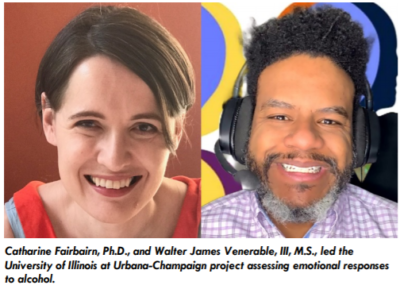Alcohol can induce temporary positive feelings such as elation and happiness and reduce negative feelings like distress. These emotional responses to alcohol are believed to contribute to drinking behaviors that lead to alcohol use disorder or that make abstaining from drinking more difficult for some people. A new study funded by the National Institute on Alcohol Abuse and Alcoholism (NIAAA) now sheds more light on the link between emotional responses to alcohol and drinking behaviors. It also reveals that emotional responses may be a predictor of alcohol-related problems.
To examine alcohol’s effects on emotions and drinking behaviors over time, Catharine Fairbairn, Ph.D., and Walter James Venerable, III, M.S., at the University of Illinois at Urbana-Champaign, combined laboratory and real-world assessments that measured emotional responses to alcohol with long-term followup surveys of alcohol consumption. In the study, 60 young adults who engaged in heavy drinking attended two beverage-administration sessions in a laboratory, in which they consumed their beverages in social groups, designed to mirror real-world drinking conditions. They also completed surveys that measured their anxiety and positive and negative moods, such as cheerful and upbeat or annoyed and sad, respectively. In one session, participants received an alcoholic beverage, and in the other session they received a nonalcoholic beverage. A subset of participants also participated in a real-world, or ambulatory, assessment for 7 days to evaluate their alcohol consumption and mood in everyday contexts. This group wore transdermal alcohol monitors and responded to random survey prompts about their mood six times per day. They also provided daily reports of their alcohol consumption. The researchers followed up with participants 18 months later.
The researchers found that participants who experienced a greater degree of positive mood after alcohol administration in the laboratory study were more likely to binge drink regularly and experience drinking problems at the 18-month followup. Similarly, participants who experienced greater reductions in negative mood were more likely to have drinking problems 18 months later. In the ambulatory study, alcohol-related reductions in negative mood measured in everyday contexts significantly predicted drinking problems at followup.
The results of the study support prior research demonstrating that emotional responses contribute to problematic drinking and that alcohol’s ability to enhance positive mood and reduce negative mood may predict problematic drinking patterns later on.
Note:
NIAAA defines heavy drinking as follows:
- For men, consuming more than 4 drinks on any day or more than 14 drinks per week
- For women, consuming more than 3 drinks on any day or more than 7 drinks per week
Reference:
Venerable, W.J.; and Fairbairn, C.E. A multimodal, longitudinal investigation of alcohol’s emotional rewards and drinking over time in young adults. Psychology of Addictive Behaviors 34(5):601–612, 2020. PMID: 32118462
This article first appeared in NIAAA Spectrum.
